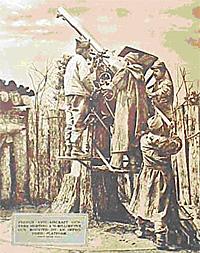Ability
Win with ability, not with numbers.
- --Field Marshal Prince Aleksandr V. Suvorov, Quoted in Danchenko and Vydrin, Military Pedagogy, 1973
Let no man be so rash as to suppose that, in donning a general’s uniform, he is forthwith competent to perform a general’s function; as reasonably might he assume that in putting on the robes of a judge he was ready to decide any point of law…
- --Dennis Hart Mahan, 1864, in Dupuy, The Military Heritage of America, 1984
Unquestionably, victory or defeat in war is determined mainly by the military, political, enonomic and natural conditions on both sides. But not these alone. It is also determined by each side’s subjective ability in directing the war. In his endeavour to win a war, a military strategist cannot overstep the limitations imposed by the material conditions, within these limitations, however, he can and must strive for victory. The state of action for a military strategist is built upon objective material conditions, but on that stage he can direct the performance of many a drama, full of sound and color, power and grandeur.
- --Mao Tse-tung, ‘Problems of directing Chain’s Revolutionary War’, December 1936, Selected Works
This is a long tough road we have to travel. The men that can do things are going to be sought out just as sure as the sun rises in the morning. Fake reputations, habits of glib and clever speech, and glittering surface performance are going to be discovered….
- --General of the Army Dwight D. Eisenhower, At Ease: Stories I tell My Friends, 1967
 Action
Action
When people are entering upon a war they do things the wrong way round. Action comes first, and it is only when they have already suffered that they begain to think.
- --Thucydides, History of the Peleponnesian War, c.404BC.
It is even better to act quickly and err than to hesitate until the time of action is past.
- --Major General Carl von Clausewitz, On War, 1832, tr. Howard and Paret
Action in war is like movement in a resistant element. Just as the simplest and most natural of movements, walking, cannot easily be performed in water, so in war it is difficult for normal efforts to achieve even moderate results. A genuine theorist is like a swimming teacher, who makes his pupils practise motion on land that are meant to be preformed in water. To those who are not thinking of swimming, the motions will appear grotesque and exaggerated. By the same token, theorist who have never swum, or who have not learned to generalize from experience, are impractical and even ridiculous: They teach only what is already common knowledge: how to walk.
- -- Major General Carl von Clausewitz, On War, 1832, tr. Howard and Paret
There is always hazards in military movements, but we must decide between the possible loss of inaction and the rise of action.
- --General Robert E. Lee, quoted in Fuller, Grant and Lee, 1933
And perhaps the most influential reflection of all: ‘In war it is often less important what one dose than how one dose it. Strong determination and perseverance in carrying through a simple ldea are the surest routs to one’s objectives.’
- --Field Marshal Helmuth Graf von Moltke, quoted in Kessel, Moltke, 1957
In tactics, action is the governing rule of war.
- --Marshal of France Ferdinand Foch, Precepts and Judgements, 1919
The essential thing is action. Action has three stages: the decision born of thought, the order or preparation for execution, and the execution itself. All three stages are governed by the will. The will is rooted in character, and for the man of action, character is of more critical importance than intellect. Intellect without will is worthless, will without intellect is danderous..
- --Colonel General Hans von Seekt, Thoughts of a Soldier, 1930
As soon as a soldier dose something, he becomes master of the situation….When man have been on the defensive for a long time, [they] send out patrols even if there be no special reason for the patrols. The patrols instill a sense of self-confidence and superiority. Inactivity and waiting undermine morale and rub nerves raw.
- --Captain Adolf von Schell, lecture at the US Army Infantry School, in Marshal, Infantry in Battle, 1939
The relief which normally follows upon action after a long period of tension – that vast human sigh of relief – is one of the most recurrent phenomena of history, marking the onset of every great conflict. The urge to gain release from tension by action is a precipitating cause of war.
- --Captain Sir Basil Liddell Hart, Thoughts on War, 1944
Back to Dispatch January 2005 Table of Contents
Back to Dispatch List of Issues
Back to MagWeb Master Magazine List
© Copyright 2005 by HMGS Mid-South
This article appears in MagWeb.com (Magazine Web) on the Internet World Wide Web. Other articles from military history and related magazines are available at http://www.magweb.com